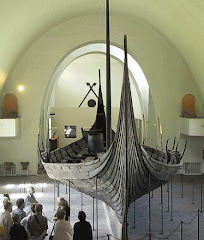3.25.2008
Egil's Saga: Part 1
I was a bit troubled throughout most of this saga, continually asking myself, where's Egil? That aside, I still enjoyed reading it very much. The character of Thorolf I found particularly intriguing. I definitely sympathized with him as he repeatedly paid for not giving Hildirid's sons any of the inheritance. I found myself wondering how a king could be so easily swayed to believe something that came from people who had motive to slander Thorolf, and without ever consulting Thorolf or others to hear the other side of the story. I enjoyed the scene about King Harald burning down the building and all Thorolf's men running out to fight. It wasn't a long scene but was very descriptive.
3.17.2008
Prologue to the Prose Edda
I found this to be a very interesting sort of story. Initially, I was reminded of the first few books of the bible: creation, the flood, etc. However, after the first few paragraphs, things deviated from the traditional biblical story. People such as Thor, Odin, and Baldr are introduced. I also noticed the large incorporation of other historical elements like Troy and the Aesir. Initially, the ideas that Snorri spouts seem far-fetched and unbelievable. But as he progresses on, he begins to incorporate Troy, Turkland, Sweden, and other places we know exist or existed. This, to the casual uninformed reader, would in a sense validate Snorri's previous claims. Snorri's reasoning for attempting to make everything more believable can only be speculated at. Perhaps he thought that by relating the very Christian creation story to Norse mythology, he could in a sense validate Christianity and slander the old beliefs, claiming they were derived from Christianity to begin with. Or perhaps he really believed everything he wrote, although I have a hard time believing that. But maybe he just enjoyed a good story. After all, as they say, the best stories are the ones we weave ourselves.
3.04.2008
Norse Mythology
This introduction to Norse Mythology, as many have already stated, was a very tedious read. There was a lot more history than I had originally anticipated, which I generally find rather boring. Unfortunately, this was no exception. However, even though I did not enjoy most of the introduction, there were some parts that I found enlightening. I found it interesting that there are so many takes on Norse Mythology. It seems that there isn't a standard "the way it was." We are even presented with two authors, Snorri and Saxo Grammaticus, contemporaries of one another, who present several differing ideas regarding Norse mythology. Something else I found interesting was the pervasiveness of euhemerism. I will admit that I had to look this word up, having no idea of its meaning. For those of you who know what this is, congratulations, for everyone else, euhemerism is the theory that mythology is derived fro history. Both the authors we are presented with, Snorri and Saxo, apparently make numerous attempts at this. From the tone of the author of this book and the context of the reading, to me it seems that at times Snorri and Saxo are grasping at straws. Attempting to make mythology more relevant by extrapolating information that might have nothing to do with anything and applying it to the myth, rather than accepting it for what it is, myth. Granted, it would seem that there is definite potential that some myths are based on history, and Snorri and Saxo were much greater scholars on the subject than I, so instead of spending the rest of my life validating there facts, I will just accept them. Sorry for the digression.
Anyway, regarding the other entries. Of the ones everyone read, I found the section on Baldr the most interesting. The section gave a lot of interesting information about Baldr, primarily his murdering by Loki. I found it odd that the only thing Baldr was not protected from was mistletoe. It was one of the first times I have seen mistletoe used with a negative connotation, after growing so accustomed to the whole "kiss under the mistletoe" tradition.
Of the other sections, I found the section regarding Buri and Audhumla the most interesting. The idea that the first being in the world was a cow is mind blowing. And then the cow creates Buri, the first god out of a block of salt by licking it. What?!! Ok, thats all.
Anyway, regarding the other entries. Of the ones everyone read, I found the section on Baldr the most interesting. The section gave a lot of interesting information about Baldr, primarily his murdering by Loki. I found it odd that the only thing Baldr was not protected from was mistletoe. It was one of the first times I have seen mistletoe used with a negative connotation, after growing so accustomed to the whole "kiss under the mistletoe" tradition.
Of the other sections, I found the section regarding Buri and Audhumla the most interesting. The idea that the first being in the world was a cow is mind blowing. And then the cow creates Buri, the first god out of a block of salt by licking it. What?!! Ok, thats all.
Subscribe to:
Posts (Atom)

